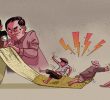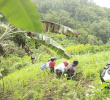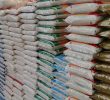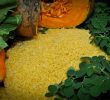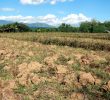“GM corn has completely changed the landscape of corn farming in the country, in a negative way,” Dr. Chito Medina, National Coordinator of farmers’ welfare advocacy group, Masipag (Magsasaka at Siyentipiko para sa Pag-ulad ng Agrikultura).
By ALEX D. LOPEZ
Davao Today
DAVAO CITY, Philippines – Farmers in the country have not benefited from ten years of the commercialization of genetically-modified corn (BT Corn), said farmers’ welfare advocacy group Masipag (Magsasaka at Siyentipiko para sa Pag-ulad ng Agrikultura).
In a statement, Masipag said GM corn varieties such as Bt-corn, RR-corn, and the stacked events (combination of Bt and RR) only push farmers into the cycle of heavy debt.
Fred Paris, Masipag’s advocacy committee chairperson for Cotabato province, said farmers are the most credible source in giving the cost-benefit assessment of the real impacts of GM corn varieties because they are the ones actually using these products.
Paris added that groups trumpeting good things about GM corn such as the Monsanto and other Trans-national Corporations (TNCs), corn traders, pro GM corn groups like PhilMaize and Asfarnet and even the Department of Agriculture cannot provide a genuine assessment because of their vested interests.
Masipag’s statement was issued in response to the 8th Philippine National Corn Congress held in the city last September. Congress participants from different parts of the country came out with a resolution focused on the development and increase of yield in corn farming. In particular, the participants urged farmers in the country to push for the passage of local ordinances promoting and upholding farmers’ rights to access biotechnology and to work for the repeal of local ordinances banning access to biotechnology.
“GM corn has completely changed the landscape of corn farming in the country, in a negative way,” Dr. Chito Medina, Masipag National Coordinator, said in the same statement.
Medina explained that seeds, with GM corn, have become a commodity because they need to be bought every planting season.
Studies conducted by Masipag and independent think-tank Ibon Foundation revealed that farmers usually run to traders or financiers to avail of loans. Medina added that, aside from seeds, farmers also need to purchase other expensive inputs needed after planting season. Farmers are charged an average of 5 percent to 10 percent monthly interest for their loans.
Inputs are priced higher when bought on a loan basis. Price mark-ups range from PHP5 to PHP30 to as high as PHP100 to PHP300 to PHP1,500 for chemicals, seeds or other inputs.
The same study found that, after four months of GM corn cultivation, farmers’ loans can rack up to interests ranging from 20 percent to as high as 40 percent. It also found out that, as GM corn seeds and inputs continue to become more expensive, farmers incur huge income losses.
The study further found that farmers lose more because traders sometimes cheat farmers by 3 kilos to 5 kilos per cavan. Thus, if a farmer sells 100 cavans of dried corn kernels to the traders at a minimum PHP10 per kilo, they may lose PHP3,000 to PHP5,000 each transaction.
“Traders, financiers, landlords and Agrochemical TNCs are really the ones benefitting from GM (corn),” Medina lamented. Often, farmers can only take home receipts from what they sold to the traders, and then the debt cycle repeats again next planting season, the Ibon and Masipag study reported.
The study also noted the steady rise of the price of input fertilizers from 2003 to 2011. Fertilizers urea and 14‐14‐14 that are commonly used by GM corn farmers increased annually by 13.7 percent and 10.6 percent respectively.
In 2008, the prices per bag of 14-14-14 peaked at PHP1,671.67 while urea rose to PHP1,551.43 per bag.
In Alamada, North Cotabato in 2011, about 12,000 hectares of GM corn farms equivalent to about 60,000 metric tons of GM corn perished early in the year because of a disease named corn leaf blight.
The DA regional office 12 traced the disease to the “no-till” practice of farmers in the area. DA said soil‐borne corn leaf blight tends to proliferate if the soil is not cultivated. Farmers in that area have since returned to the practice of deep-plowing. (Alex D. Lopez, davaotoday.com)

